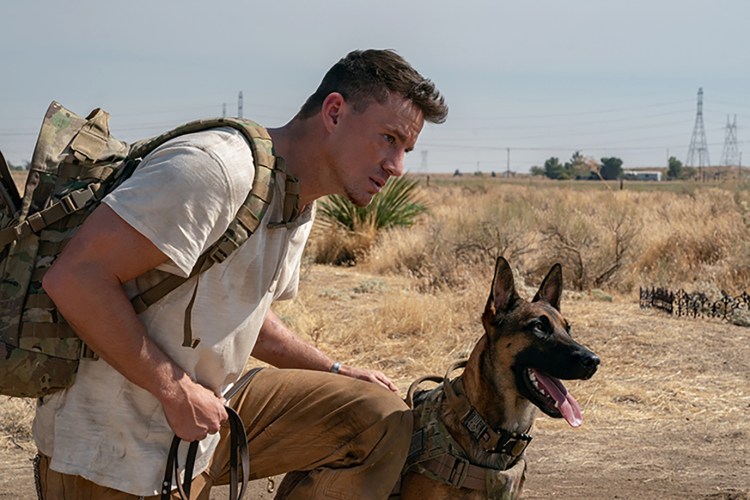Trailers for the movie “Dog” – co-directed by and starring Channing Tatum as a retired Army Ranger named Riggs who takes a former K-9 comrade to her handler’s funeral – make it look like a fun road trip. Lulu, a Belgian Malinois, is a difficult dog: She chews the car seats, grabs snacks at every opportunity.
Cute guy, cute dog, cute movie. Right?
Wrong.
“Dog” turns out to be a deeply thoughtful, surprisingly resonant look at trauma and what stems from it. Lulu isn’t a bad dog – she’s broken. So is Riggs. They’re both no longer Rangers because they are no longer fit for duty, thanks to that all-too-common combination of traumatic brain injury and PTSD.
Lulu can no longer work and it’s not safe to adopt her out, so after Rigg’s stop at his buddy’s funeral, he plans to drop Lulu off at a military base, where she’ll be put down. Once he does, he’ll be permitted to join a private military contractor, despite his own brokenness. So the two begin their odyssey from Oregon to Arizona, making several stops along the way. Though the story can be predictable and pat at times, there’s something more, something deeper behind the plot.
Riggs’s early frustration with Lulu is understandable. She used to be well-behaved; she had a job and did it well. Now she’s scared of everything, and she doesn’t know why. Riggs keeps asking her what went wrong. (She is, unsurprisingly, unresponsive). He wants to know how she lost her way, why she seems insistent on destroying herself and her legacy, strongly implying that if Lulu just wanted it enough, she could get better. Riggs even points out that euthanasia isn’t a “warrior’s death.”
Then he goes out and gets drunk, comes home, pops pills, and wakes up to another day where his ears won’t stop ringing and he doesn’t get to do what he’s trained to do – because that nearly killed him.
(A bit of context: Many canine veterans end up being euthanized, as their training and experiences can make them hard to adopt. Soldiers, obviously, aren’t. Yet on average, at least 16 veterans take their own lives every day.)
The connection between Lulu’s and Riggs’s PTSD is never laid on too thickly, but it’s there. And because it’s there, it gives the audience a new way to connect to someone who’s suffering. A highly trained combat veteran with rage issues and night terrors is scary, and it’s easy to look away. A dog? It’s a little harder to turn away from Lulu’s big brown eyes, and easier to see that underneath her muzzle is a desperately sad, scared creature who is worth the effort it takes to save.
Tatum’s varied background in film serves him well here. He’s as believable as a military man as he was in “White House Down,” as funny and as charming as he was in the “21 Jump Street” movies. What’s more, his serious turn in “Foxcatcher” was no fluke: He can really act. Considering we spend the vast majority of the movie with him and Lulu in his truck, that’s a relief.
He’s harder to judge as a director, since he’s working as a team here (with Reid Carolin), but there are a number of shots that are truly lovely. Even the choice of landscape works on a deeper level; as Riggs and Lulu leave the lush woods of Oregon for the arid plains of Arizona, the scenery begins to look more and more like the desert areas of Afghanistan, where Riggs and Lulu met and served together.
While “Dog” is often funny, it’s not a comedy. Though it’s often sad, it’s not a tragedy either. Instead, it’s a sensitive, engaging, realistic look at what happens when a soldier’s toughest battle starts when they come home. It’s not the movie its marketing would have you believe it is. It’s much, much better.
Send questions/comments to the editors.



Success. Please wait for the page to reload. If the page does not reload within 5 seconds, please refresh the page.
Enter your email and password to access comments.
Hi, to comment on stories you must . This profile is in addition to your subscription and website login.
Already have a commenting profile? .
Invalid username/password.
Please check your email to confirm and complete your registration.
Only subscribers are eligible to post comments. Please subscribe or login first for digital access. Here’s why.
Use the form below to reset your password. When you've submitted your account email, we will send an email with a reset code.